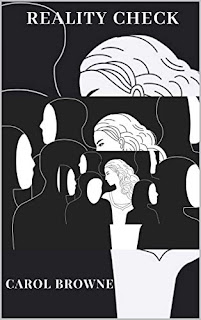Living with Third Man Syndrome
August 31, 2020 | Author Friend Promo
Why I Wrote psychological Fiction
by Carol Browne
When I was recently asked to write a post about why my latest book is psychological fiction, I hesitated. After a lifetime of keeping quiet about my mental health issues, I was reluctant to shine a light on anything that might expose them to public scrutiny. They say you should write what you know, but that can often be disturbing. However, public opinion on such matters has shifted significantly in recent years and the stigma caused by any kind of psychological divergence from what is considered normal, is quickly fading as more people are open about their quirks and aberrations. And once you start researching this subject you find you are not as strange as you thought you were!
 |
| Photo by Jamie Taylor on Unsplash |
I have been there, done that, and bought the T-shirt when it comes to coping with OCD, depression, social phobia, and panic attacks, but years of living on my own brought on another phenomenon that was to inspire my latest novella Reality Check. The phenomenon is called Third Man Syndrome and it meant nothing to me until I was researching the book. In effect, it is when social isolation or trauma makes people imagine there is someone with them when there isn’t. At first, I didn’t know this had a name. I assumed it was like having an imaginary friend and that’s how I approached the book. I got so intrigued by this subject I thought, “What if a lonely person imagined LOADS of people who weren’t there? What if they lived in a house full of imaginary people and interacted with them?”
The imaginary friend phenomenon was the starting point but the book ended up being an investigation into the nature of reality itself as the main character tries to work out what is going on. Is this a symptom of madness? Are these people real or not? And what do we mean by ‘real’? Reality itself has so many layers it might turn out to be impossible to define it with any certainty.
And when you think about it, this is what we writers do. We create loads of imaginary people and build worlds for them to live in. They are real to us and we hope our readers feel the same way. And if it’s a symptom of anything it’s the fact that we humans are doomed to live mostly in our heads. We are both blessed and cursed with boundless reserves of imagination and creativity.
Yes, I do have an imaginary friend. I try not to talk to her but I can’t help myself. She’s only real in so far as she exists in my head. But if you live alone, eventually you must have someone to bounce ideas off. You have to be able to tell someone about your day. You must get advice from somewhere. How many other people experience this, I wonder? I have often seen lone shoppers in the supermarket talking to themselves about what to buy for their dinner. Perhaps they aren’t really talking to themselves but to someone only they can ‘see’. I expect they live alone like me and they can’t help it. So far I have resisted the temptation to talk to my imaginary friend in public, but it’s only a matter of time!
Here’s a brief intro to my psychological fiction book. I hope you like it.
Gillian Roth finds herself in middle age, living alone, working in a dull job, with few friends and little excitement in her life. So far, so ordinary.
But Gillian has one extraordinary problem.
Her house is full of other people… people who don’t exist. Or do they?
As her surreal home life spirals out of control, Gillian determines to find out the truth and undertakes an investigation into the nature of reality itself.
Will this provide an answer to her dilemma, or will the escalating situation push her over the edge before she has worked out what is really going on?
EXCERPT
“Everything is energy,” I said, and swallowed down a lump in my throat. A lump composed of both unease and excitement in equal measure.
“Indeed. Just energy vibrating at different frequencies,” he said. “So while you think about that, here’s another interesting phenomenon that has been recorded many times, and it seems to me it has something in common with imaginary friends. Have you heard of the third man syndrome, Gill?”
I had to admit this meant nothing to me.
“Here’s an example of it,” he went on. “A mountaineer called Frank Smyth attempted to climb Mount Everest but had to turn back before he reached the summit. He reported that although he was completely alone during his descent, the feeling that someone was with him was so powerful he tried to share his Kendal mint cake with this person.
“The phenomenon is said to originate with Shackleton in 1916. While he was exploring Antarctica, Shackleton saw the apparition of a person alongside his two companions. There are countless reports of this from people who have survived terrorist attacks or extreme trauma. Some sort of threat to existence or even severe social isolation” — at this point the Professor gave me a knowing look — “can trigger this phenomenon. Some people might try to explain it with terms such as guardian angel or spirit guide, but could it be a hallucination or defence mechanism that switches on to help the brain deal with trauma and stress? It frequently happens that these apparitions offer comfort and support, and yet what of those cases where the third man not only gives advice but even leads people to safety when they find themselves in a life-threatening situation? That goes beyond mere imagination surely?” He raised his eyebrows, as if inviting a response, but his information had overwhelmed me. “I see I’ve given you something to think about. My advice is you go and do some research on this yourself.”
For a moment my mind slipped, stumbled, staggered about looking for something to grab on to. What was going on here? I looked at the Professor and he stared back, innocent as a kitten, waiting for me to speak. If I didn’t speak, would our exchange stop now? I was really talking to myself, for God’s sake. He can’t have done any research. He didn’t exist. I must have done it and either forgotten I had, or pretended to forget so it would all seem like new information.
Was I so needy I had to resort to these ludicrous mind games?
“You’re not real,” I said.
I stood and marched out of the room, my jaw clenched so hard it ached, my hands balled into fists. If there was no gin in the fridge, there’d be hell to pay, but, thank God, there was nearly a full bottle. Two stiff drinks were all I’d need for now, just to take the edge off.
Stay connected with Carol on her website and blog, Facebook, and Twitter.






